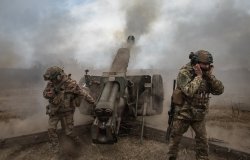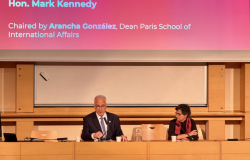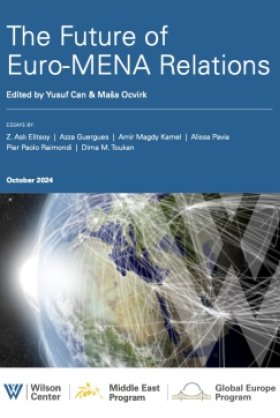Is Macedonia Next? (March 2001)
During the past few weeks two significant events have taken place in the Republic of Macedonia. First, the leaders of eight countries in the region along with representatives of the European Union met in Skopje as part of the South Eastern Europe Cooperation Process. The Skopje Summit was an opportunity for the democratically elected leaders to reiterate their commitments to building peace, stability, strengthening good neighborly relations and, of course, to push for faster integration of the countries into the EU and NATO. The leaders of Macedonia, Greece, Albania, Turkey, Bulgaria, Romania, Yugoslavia and Bosnia-Herzegovina also adopted an "Action Plan for Regional Economic Cooperation." The fact that these recent enemies, now allies, came together for such an event is inspirational for the future of the region.
The second event unfortunately, totally overshadowed that extraordinary meeting. In February, violence instigated by ethnic Albanian extremists broke out on the Macedonia-Kosovo border and in and around the key town of Tetovo. The violence has resulted in the deaths of four Macedonian soldiers. These two juxtaposed events, the Skopje Summit and the outbreak of violence, are, sadly, a reflection of today's reality in the Balkan region.
If the aspirations of the Summit are to become the prevailing reality, the recent attacks by Albanian extremists on Macedonia's border with Kosovo and in Tetovo must be stopped immediately. The Republic of Macedonia was the only country to declare independence from the former Yugoslavia peacefully, and has remained peaceful and stable throughout the decade of surrounding turbulence in the Balkans. Thus, Macedonia has become a beacon for neighboring states. Macedonia's peace, and with it, the hopes of its neighbors, are now threatened.
The Republic of Macedonia has, thus far, been a successful model of a multi-ethnic society, resolving conflicts via political dialogue, abiding by democratic principles, and developing a market economy. Even in the current border crisis, Macedonia has proven its commitment to pursuing the peaceful path. Both its Macedonian and Albanian leadership swiftly condemned the attacks and requested assistance of the international community in resolving the crisis. The international community, with its huge stake in regional peace, cannot stand by and let external forces destabilize Macedonia, a nation that has proven its dependability as a NATO ally, particularly during the Kosovo crisis. During the Kosovo crisis, Macedonia answered the call for help by taking in approximately 350,000 refugees, almost 17 percent of the population.
Macedonia has been a success story, perhaps the only success story of today's Balkan world. Since Macedonia's independence in 1991 there have been continuous predictions that it would be drawn into war. Thus far, Macedonia, due to it own enlightened policies and with the assistance of the international community, has avoided such carnage. The deployment of UNPREDEP in 1993 helped prevent the spillover of fighting from the north. With the help of UN and U.S. mediation, Macedonia and Greece, once enemies, have become strong allies. Throughout, Macedonia has succeeded in achieving good relations with all of its neighbors.
But the drums of war are now beating on its border with Kosovo. The Republic of Macedonia stands at yet another crossroads in its long and complex history. Like its neighbors, it yearns for stability, prosperity, and peace. If peace is to prevail, a new vision, a new policy for a new Balkan order is needed. The Skopje Summit proved that the democratically elected leaders of that region are committed to pursing a policy of cooperation for this new century. Those few who want to keep the Balkans rooted in its tumultuous past must not be permitted to succeed. Over the past decade the Balkans has seen too much bloodshed, while the West has made tremendous military investments in the region. It is time for the international community and particularly the United States to renew and invigorate their commitment to the region and to seeing a return on its investment—a peaceful and prosperous Balkans prepared to assume its constructive and contributing role among the family of nations.
To this end, I propose the following three steps:
The first step must be for NATO to immediately secure the border between Macedonia and Kosovo. The international community cannot let external extremists destroy the progress that Macedonia has made in ethnic relations. A destabilized Macedonia will have wider ramifications. War in Macedonia will be the failure of the international community.
Second, the recent statement by Secretary of State Colin Powell that the U.S. will not withdraw from the Balkans is encouraging, but a stronger commitment is needed from Washington. Afterall, it is in the United State's security interests to secure a lasting peace in the region. Over the past few years the United States has had a strong commitment in the Balkans and it should not abandon the region in midstream. The absence of a long-term strategic policy by the United States towards the Balkans will create a vacuum, which will be exploited by the enemies of peace.
Third and the most important factor for the future stability of the Balkan region is economic development. Western Europe and the United States must become totally committed in helping the Balkans develop economically. The Stability Pact must move at a much faster pace. The region needs investment. Economic development is a precursor to democracy and political stability.
Western leaders must help in the development and reconstruction of the Balkans. They must not wait until it is too late. George C. Marshall, architect of the plan that served Western Europe's democratic path, said, "Wars are bred by poverty and oppression. Continued peace is possible only in a relatively free and prosperous world." It was true of Europe then, and it is true of Macedonia and the Balkans now.
About the Author
Ljubica Acevska
Read More
Global Europe Program
The Global Europe Program is focused on Europe’s capabilities, and how it engages on critical global issues. We investigate European approaches to critical global issues. We examine Europe’s relations with Russia and Eurasia, China and the Indo-Pacific, the Middle East and Africa. Our initiatives include “Ukraine in Europe” – an examination of what it will take to make Ukraine’s European future a reality. But we also examine the role of NATO, the European Union and the OSCE, Europe’s energy security, transatlantic trade disputes, and challenges to democracy. The Global Europe Program’s staff, scholars-in-residence, and Global Fellows participate in seminars, policy study groups, and international conferences to provide analytical recommendations to policy makers and the media. Read more











